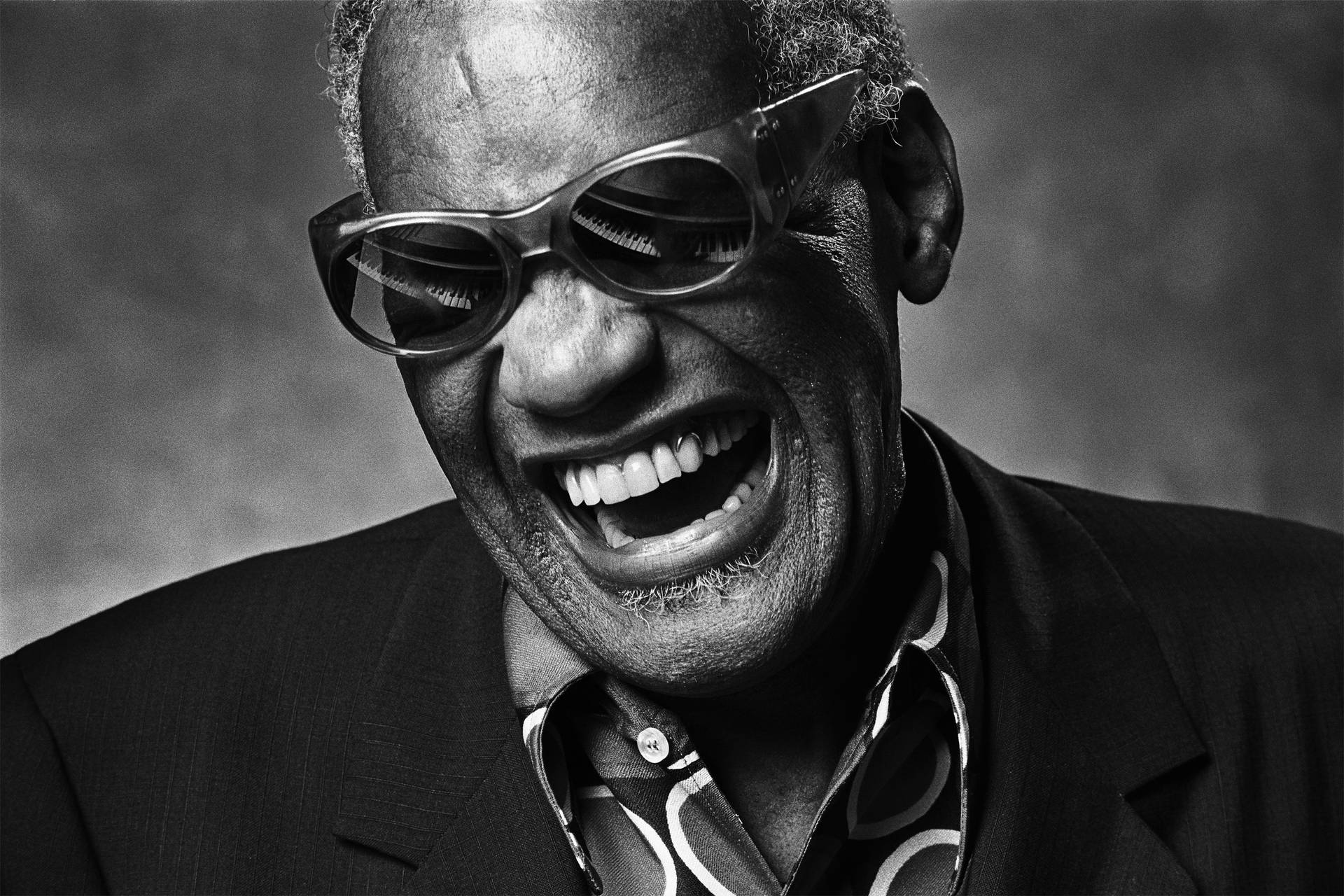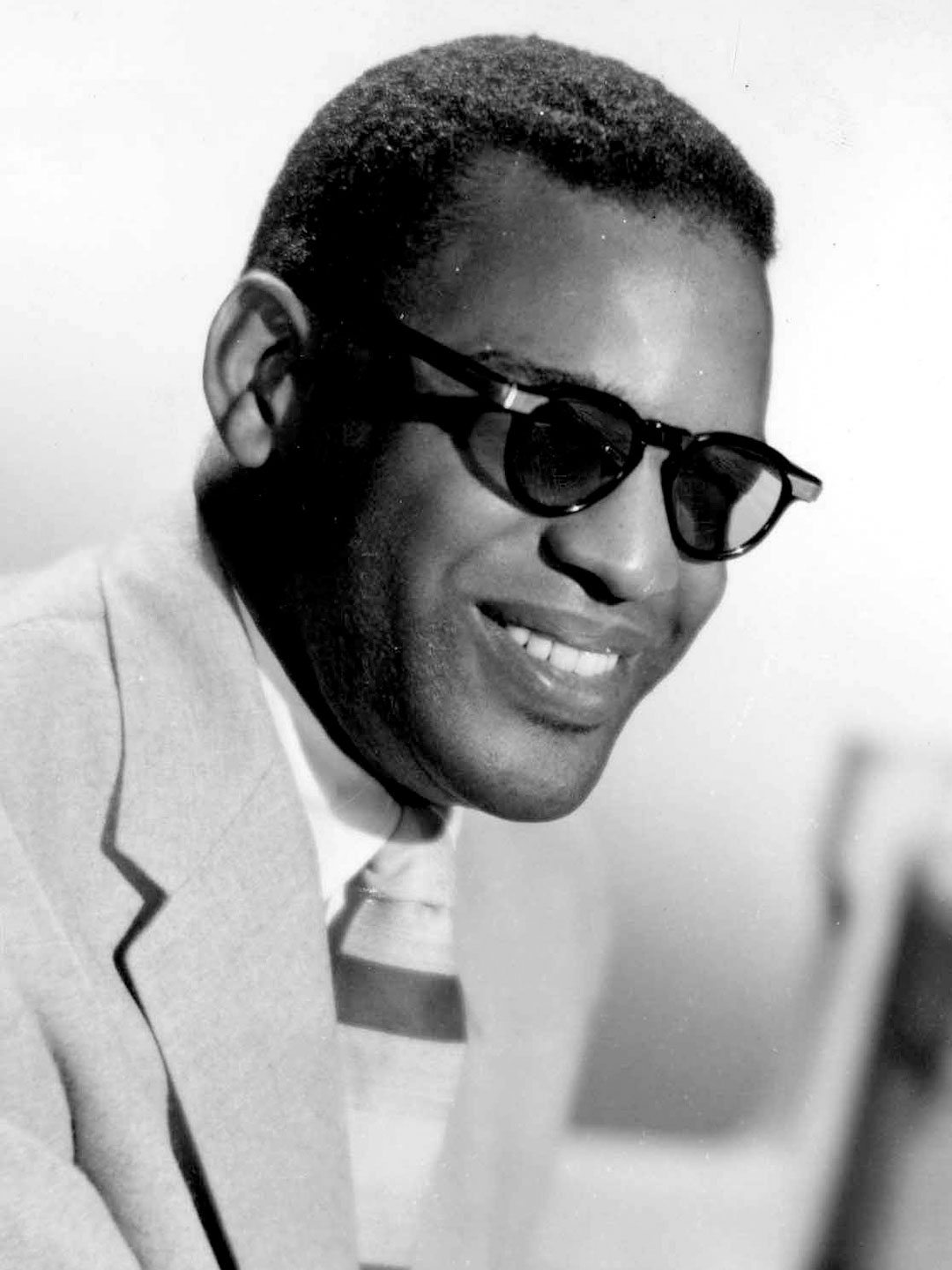Unforgettable: Ray Charles' Greatest Hits & Legacy
Could a single name encapsulate the very essence of American music? Ray Charles, a name synonymous with innovation, raw emotion, and unparalleled talent, undeniably achieved precisely that. His impact resonates through genres, generations, and cultures, shaping the musical landscape as we know it.
Born Ray Charles Robinson in Albany, Georgia, the journey to becoming "The Genius" was paved with both triumph and adversity. His early life, marked by poverty and the tragic loss of his sight at the age of seven, instilled in him a resilience that would become his defining characteristic. From the humble beginnings of playing piano in his youth to eventually signing his name on millions of record, Ray Charles transcended the boundaries of race, prejudice, and the limitations imposed by his physical condition. His music, a vibrant tapestry woven from the threads of gospel, blues, jazz, and country, became a powerful force for bridging divides and uniting people through the shared experience of emotion.
| Category | Details |
|---|---|
| Full Name | Ray Charles Robinson |
| Born | September 23, 1930, Albany, Georgia, U.S. |
| Died | June 10, 2004, Beverly Hills, California, U.S. |
| Genres | Soul, Rhythm and Blues, Jazz, Gospel, Country |
| Instruments | Piano, Vocals |
| Occupation | Singer, Songwriter, Pianist, Bandleader |
| Years Active | 1940s 2004 |
| Notable Songs | "Georgia on My Mind," "Hit the Road Jack," "What'd I Say," "I Can't Stop Loving You" |
| Awards | 17 Grammy Awards, Grammy Lifetime Achievement Award, Kennedy Center Honors |
| Associated Acts | The Raelettes, Atlantic Records, ABC-Paramount Records |
| Reference | Grammy.com |
The young Ray's musical journey commenced in the segregated South. He was enrolled at the St. Augustine School for the Deaf and Blind in St. Augustine, Florida, where he received his early musical training. This pivotal education provided him with the foundation he would build upon, fostering his innate talent and giving him the tools to navigate a world that often underestimated him. Here, he learned to read and write music in Braille, mastering various instruments, particularly the piano, which would become his signature. This early period was critical, setting the stage for the musical innovator he would become.
Charles's early career took him through various musical landscapes. He began by emulating the styles of his idols, including Nat King Cole and Charles Brown. He moved to Seattle in his late teens and found work playing piano and singing in various clubs. His initial recordings in the late 1940s and early 1950s showed a promising artist with a unique take on the blues and jazz. These early performances and recordings, marked by his distinctive vocal inflections and piano style, were a prelude to the groundbreaking music that would follow.
The mid-1950s marked a turning point. It was during this era that Ray Charles began to truly forge his own path. He signed with Atlantic Records in 1952, and the label provided him with the creative freedom to explore his musical vision. He started incorporating elements of gospel music into his blues, creating a revolutionary sound that would come to be known as soul. This fusion, a bold and controversial move at the time, was the key to his breakthrough and the beginning of his rise to fame. This unique blend of styles was something that had never been done before, the raw energy of gospel music infused into his blues, it was innovative.
"I Got a Woman," released in 1954, was a pivotal moment. It was a fusion of gospel, blues, and jazz that captivated audiences and became a template for the burgeoning soul movement. The song's infectious energy and Charless impassioned delivery made it an immediate success. Other hits soon followed, solidifying his status as a major musical force. "This Little Girl of Mine," "Hallelujah I Love Her So," and "What'd I Say" further cemented his reputation, and became anthems, these songs were not just hits; they were cultural touchstones. His live performances became legendary, known for their raw energy, charismatic stage presence, and the profound connection he forged with his audience.
Charles's music challenged racial barriers and spoke to the shared human experience. His music transcended racial boundaries and became popular with both black and white audiences. He used his platform to advocate for civil rights, refusing to play segregated venues and supporting the movement through his artistry. In an era rife with discrimination, Charles's music brought people together.
The early 1960s brought another shift in his career. He left Atlantic Records for ABC-Paramount, and under his new contract, he was afforded even more creative control. This period saw him expand his musical palette even further, exploring country music with stunning results. His landmark album, "Modern Sounds in Country and Western Music" (1962), was a bold move. It was a critical and commercial success, and it introduced a whole new audience to the genre. Tracks such as "I Can't Stop Loving You," "You Don't Know Me," and "You Are My Sunshine" became massive hits and remain standards to this day. This foray into country music demonstrated his versatility and his refusal to be confined by genre boundaries, proving that good music is good music.
Throughout the 1960s and beyond, Ray Charles continued to evolve, always exploring new musical territories. He embraced jazz, pop, and even big band music. He collaborated with a diverse array of artists, including Stevie Wonder, Willie Nelson, and B.B. King. He kept touring extensively and produced countless albums, each showcasing his unmatched talent and musical depth. He was a perfectionist in the studio, and he was always pushing the boundaries of his craft. Despite his fame, he maintained an unwavering focus on his music and his commitment to his craft.
Charles's personal life, like his musical journey, was marked by both struggles and successes. He battled drug addiction for many years, a struggle that he ultimately overcame. He was also known for his complex relationships and his large family. However, even during difficult periods, he never lost his passion for music. His resilience and determination were as striking as his musical talent. These hardships, though they tested his spirit, ultimately added depth and nuance to his artistry, making his music all the more compelling and resonant.
Ray Charles's influence on American music is immeasurable. He is credited with shaping the sound of soul music and influencing countless artists across genres. He inspired such giants as Stevie Wonder, Aretha Franklin, and James Brown. His unique ability to blend styles, his emotive vocals, and his innovative piano playing have set the standard for generations. He wasnt just a musician; he was a cultural icon, a voice of a generation and a true innovator. His music is played on radios all over the world, and his influence can be seen in almost every genre of popular music.
His impact extends beyond his musical achievements. He was a pioneer in the fight for racial equality, using his platform to promote civil rights. He was also a businessman who gained creative control and ownership of his work, a rarity in the music industry during his era. These accomplishments cemented his legacy as an artist of immense talent and integrity. Charles's ability to secure creative control of his masters was another groundbreaking move. He was one of the first major artists to do so, a testament to his business acumen and his commitment to protecting his work.
Ray Charles received numerous awards and accolades throughout his career, including 17 Grammy Awards, a Grammy Lifetime Achievement Award, and the Kennedy Center Honors. In 1986, he was one of the first inductees into the Rock and Roll Hall of Fame. He continued to perform and record music until his death in 2004, leaving behind a vast catalog of iconic recordings that continue to inspire and move audiences. He was an entertainer who lived to create and give joy through his music. His passing marked the end of an era, but his music and his spirit live on, continuing to inspire and entertain millions around the world.
Ray Charles's legacy is secure. He was a visionary artist, a cultural icon, and a true original. His music continues to be discovered and enjoyed by new generations, ensuring that the genius of Ray Charles will never be forgotten. He remains a testament to the transformative power of music and the enduring human spirit. His music continues to tell stories of triumph, resilience, and the indomitable spirit of humanity.


/https://img.discogs.com/CEGDiG-6709qz92cAbx274XvveM%3D/600x400/smart/filters:strip_icc():format(jpeg):mode_rgb():quality(90)/discogs-images/A-30552-1451559463-6497.jpeg.jpg)
Detail Author:
- Name : Miss Makayla Simonis
- Email : abeatty@gmail.com
- Birthdate : 1986-12-06
- Address : 3344 Johnny Greens Hermistonton, NJ 42332
- Phone : +1 (484) 258-6797
- Company : Heidenreich, Wunsch and Reichel
- Job : Transportation Inspector
- Bio : Perferendis molestiae est omnis quas est ut qui. Delectus explicabo eos quia voluptas. Consequatur minima aspernatur maiores explicabo.